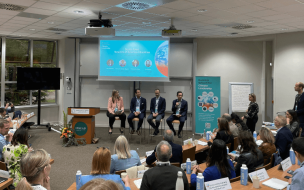With a variety of use cases ranging from drafting emails to summarizing texts and generating ideas, ChatGPT has immediately impacted the business landscape. Goldman Sachs predicts it, and other generative AI innovations, could replace up to 300 million jobs in future.
ChatGPT has helped facilitate the adoption of various other AI tools—today you can find platforms allowing you to generate audio and visual media, edit recordings, create logos, and even animate still images.
The rise of generative AI means employers are increasingly seeking new hires with AI skills. Business schools, too, are incorporating the technology into the learning experience to help boost students’ employability.
But the benefits of using AI at business school go beyond just increasing your job prospects. Here are four ways you can use AI to maximize your learning potential, ease your workload, and get ahead at business school.
1. Employ a virtual super assistant
When adopting AI into your working process at business school, your aim should be to save time by working more efficiently, not to avoid work altogether.
This is especially true because of ChatGPT’s propensity to create false answers when it has no other information available. For example, if you asked ChatGPT to write an essay on business ethics, there’s a high chance that some of the information it contained would be false.
To avoid this issue, you should use ChatGPT primarily to complete various tasks alongside your work that can speed up the process. Essentially, it should be your “virtual super assistant”, says Johan Hombert, professor of finance at HEC Paris.
“Ask it to summarize information on a given topic, ask for relevant sources, and then fact check. Ask for an analysis of your research question, ask it to explain the logical steps and sources, and check the consistency of the argument,” he explains.
2. Learn to prompt effectively
The key to unlocking the potential of ChatGPT at business school is learning how to use the right prompts.
Prompts are the questions or requests you input into ChatGPT. Getting them right is so essential that prompt engineering is now a rapidly growing job function within the AI sector.
Ineffective prompting will result in irrelevant or unhelpful information. It may also take several more attempts before you finally get to the root of the problem you’re trying to solve.
So how can you prompt effectively?
Often it’s a good idea to ask ChatGPT to define a topic or problem area before asking it related questions. For example, you could start by asking it to provide an outline of corporate finance, before prompting it to provide three corporate finance strategies commonly used today.
Specificity is essential, says Linus Dahlander, professor at ESMT Berlin and holder of the Lufthansa Group Chair in Innovation. “ChatGPT is not your friend—you can be direct and blunt. It won’t be annoyed if you tell it to redo the work. Be precise about what problem you would like to solve.”
3. Use a wide range of AI tools
Of course, ChatGPT is not the only AI tool you can use to maximize your output at business school. There’s a whole host of platforms available that can help you with tasks such as organization, research, and content production.
Transcription tools including Otter.ai allow you to transcribe your lectures and classes in real-time, leaving you free to concentrate on the subject matter without taking notes.
Data gathering tasks can be streamlined using tools such as ResearchRabbit, which will find and summarize relevant documents in your area of interest, allowing you to focus on analysing your research.
While taking part in group projects or practical assignments, you’ll often be tasked with delivering a presentation to summarize your findings. Tools such as Canva or Beautiful.ai are available to help you with the design process, providing template suggestions and automatically formatting your content.
A significant issue students often experience when arriving at business school is dealing with the intense organizational burden of having to balance classes, extracurricular activities, and project work.
AI planners are therefore arguably the tool that can have the most significant impact on your study experience. Tools such as Clockwise and Motion can intelligently organize your workload by analyzing your typical daily practices—including when you’re most productive—before making automatic changes to your schedule.
Incorporating a few of these tools into your routine can significantly free up your time and improve your efficiency at business school, feels Sarah Grant, director of the Innovation, Digital Education & Analytics (IDEA) Lab at Imperial College Business School.
“These resources, when properly utilised, can serve as powerful aids to enhance students’ academic efficiency and output.”
4. Focus on enhancing your learning ability
It can be tempting to think of generative AI as simply a tool to help you speed up the process of completing tasks assigned to you at business school.
While ChatGPT and similar tools can be effective in easing your workload, remember that learning how to use these tools and developing your AI skills is equally important to get the most out of your study experience.
Focus on developing your skills, using your imagination to come up with creative ways to employ the various AI tools available to your advantage. Critically analyzing different use cases for tools within the working environment is also an effective way to develop your expertise.
Adopting this learning-first approach will help prepare you for the emerging AI work landscape after you graduate, says Johan Roos, Professor and Chief Academic Officer at Hult International Business School.
“Students should not think about ‘easing workload’, but how new AI tools can help them learn more effectively, efficiently, and responsibly.”
Next Read:
Will AI Transform The Business School Classroom? It Already Is







